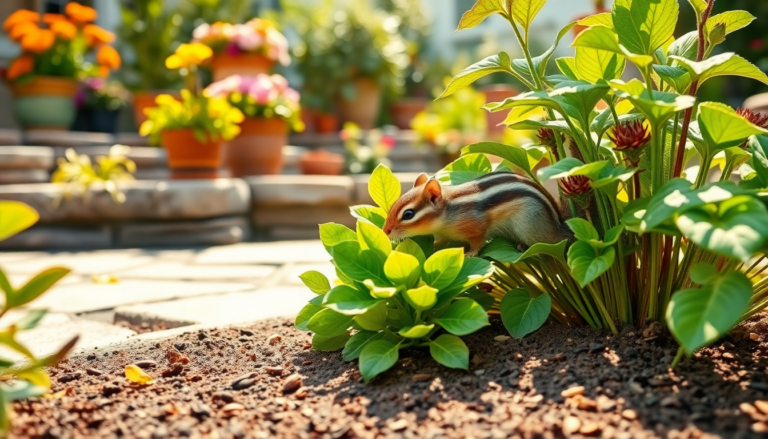Argomenti trattati
Chipmunks, with their adorable demeanor and fluffy cheeks, have a way of charming garden enthusiasts. But don’t let their cute looks fool you—these little creatures can wreak havoc in your outdoor spaces. When chipmunks start burrowing under your patio or snacking on your prized plants, their less-than-cute side comes out. So, how can you effectively manage these furry intruders and protect your garden? Let’s dive in!
Understanding the Chipmunk Dilemma
Despite their small size, chipmunks can cause serious damage to gardens and even undermine structures like retaining walls and home foundations. According to wildlife specialists, these busy little burrowers create extensive tunnel systems that can lead to significant soil erosion and various structural concerns. Their diet is surprisingly varied, ranging from seeds and berries to nuts and even small animals like eggs and insects. With such an omnivorous appetite, it’s no wonder they keep coming back if they find a reliable food source!
Gardeners might spot signs of a chipmunk invasion in the form of small holes in flower beds, missing plants, or piles of seed shells. Although it might be tempting to eliminate them completely, it’s important to remember that chipmunks do play a role in the local ecosystem. Instead, consider effective ways to manage their presence while keeping the balance of nature intact.
Identifying the Problem
Before you jump into a management strategy, it’s essential to confirm that chipmunks are the real culprits. Look for burrow entrances that are usually about two inches wide and don’t have surrounding dirt mounds—this little detail helps differentiate them from the damage caused by other small mammals like mice or voles. Getting the right ID means you can choose the most suitable and effective methods for dealing with them.
Food availability plays a significant role in chipmunk behavior. If you leave bird feeders, pet food, or fallen fruits unattended, you’re basically rolling out the red carpet for these little critters! Keeping feeding areas clean and harvesting ripe produce promptly can significantly reduce their attraction to your garden.
Effective Management Techniques
So, what can you do to keep chipmunks at bay? One option is to use commercial repellents that feature bitter flavors or predator scents. These can provide short-term relief when applied around your garden beds or burrow entrances. However, keep in mind that these solutions need frequent reapplication and may lose their effectiveness over time as chipmunks get used to the scents.
On the other hand, physical barriers can be a more reliable deterrent. Using mesh or hardware cloth to cover raised beds or new plantings can effectively keep chipmunks from accessing your plants. It’s a good idea to bury these barriers at least six inches deep and bend them at the bottom to thwart any tunneling attempts. Additionally, covering soil with gravel or landscaping fabric can help deter digging activities.
If barriers and repellents aren’t cutting it, live traps can be an option to reduce chipmunk populations. Place these traps strategically near burrow entrances and bait them with tempting treats like peanut butter or sunflower seeds. Just be sure to check local regulations regarding the relocation of trapped animals, as it may be illegal in some areas due to ecological concerns.
Long-Term Solutions for a Chipmunk-Free Garden
For those areas where chipmunks love to burrow, such as under decks and patios, sealing off these spaces with heavy-gauge hardware cloth can be incredibly effective. Plus, it’s essential to patch any cracks or holes in your home’s exterior to eliminate potential entry points. Avoid using soft materials like foam or untreated wood, as chipmunks can easily gnaw through them.
A tidy yard can also help deter chipmunks. Dense shrubs, wood piles, and cluttered areas provide excellent hiding spots for these little guys. Regularly trimming overgrown plants and elevating firewood can discourage chipmunks from calling your garden home. They prefer open spaces where they feel exposed to predators, so making your property less inviting can do wonders!
While there are many DIY chipmunk deterrents floating around online, like mothballs or garlic, these often lack scientific backing and may only yield temporary results. In some cases, they might even pose risks to pets or beneficial wildlife in your garden.
In conclusion, if chipmunks continue to wreak havoc in your garden despite your best efforts, it might be time to consult a wildlife control professional. They can provide insights into safe and legal solutions for managing chipmunk populations, ensuring your garden remains intact for future planting seasons. So, are you ready to take back your garden from those cheeky chipmunks?

